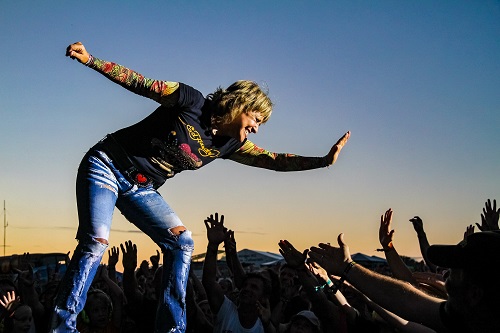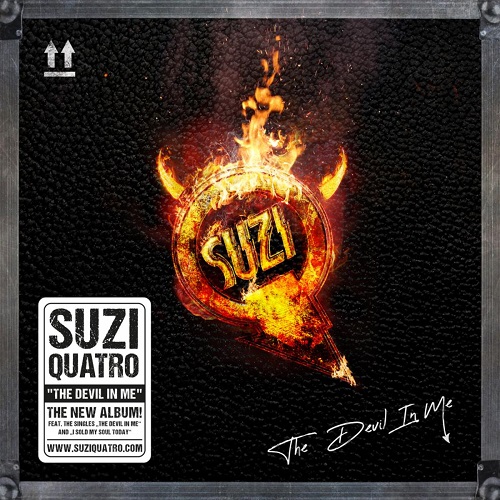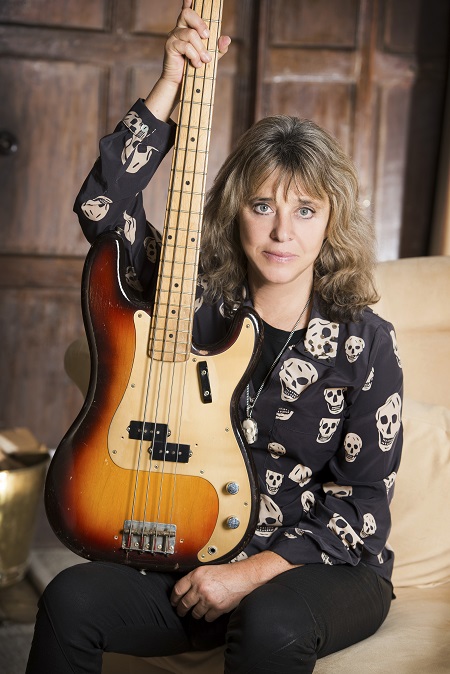By Greg Prato
Whether it be inspiring countless rockers — both female and male — with a string of early 70s classic singles (“Can The Can,” “48 Crash,” “Devil Gate Drive,” etc.) or starring as the popular recurring character Leather Tuscadero in Happy Days, Suzi Quatro has been an influence on countless musicians (one of her most vocal supporters being Joan Jett).
And recently, there has been a much-deserved wave of reappreciation for the Detroit-by-way-of-London singer/bassist — including a great 2019 documentary, Suzi Q, as well as two inspired rockin’ albums, 2019’s No Control and 2021’s The Devil in Me.
Quatro spoke with VintageRock.com shortly after “Do Ya Dance,” the second single and video from The Devil In Me, was released, and a month before she was to headline the legendary Royal Albert Hall in London.
~
Let’s discuss your latest album, The Devil In Me.
Everybody that’s done any kind of review or interviewed me — DJ or critic — they’ve all said it’s my best work since my first album. So, I opened my big mouth…but I didn’t have to say it — because everybody else has said it to me! No Control was my son (Richard Tuckey) and I getting our feet wet with each other — we hadn’t worked together before. And we didn’t know what we were dealing with — so it was that kind of album. Everybody loved it. And now when the company took up the option for the next album, my son had gathered his confidence a little bit — naturally — from the first one, and he really went…bang! He said, “I know what this album should sound like.” He kept saying all through the album, “Trust me.” I didn’t let him take over, but I let him lead. And I kind of followed. Sometimes, he’d give me a riff, and I’d go, “Hmmm.” I’d start to work on it, and I’d go (makes light bulb sound going off). So, what he did with this is he said, “I want this album to be as groundbreaking as your first album.” That was his personal benchmark. Sure, we had a few ups and downs — as you do when you’re creating – but he allowed me to see me, as if I were seeing me for the first time. I was seeing myself through his eyes. I was going, “Oh!” I was getting excited. So, he wanted to return me to that feeling. And in fact, he did. So, applause to him.
The album’s first single was “Motor City Riders.”
I had this riff. Richard is a real riff guy, but I had one, and I went out to the studio, and he took it from me — because I’m not a great guitar player. I didn’t go from guitar to bass — I started on bass. I played it, he took it, and I said, “Yeah. That’s what I meant.” He said, “You should write something about Detroit.” And I immediately thought, “Motor City Riders.” It just was exactly correct. And then because I was going to write it about Detroit — which is obviously my hometown — I took time with these lyrics. Because I wanted them to express every syllable of what it was like to go as a ‘60s teenager growing up in that atmosphere — in Detroit. It was quite special. You had your riots in that era. Everything was happening – the music, black and white, Motown and white rock. Fantastic era to grow up. So, I took very much care. And I have to say it’s a well-written lyric, because I took it from deep inside.
And the latest single is “Do Ya Dance.”
That was a track that Richard had done as a demo when he gave it to me, and I went, “Not my normal thing.” It was called “Ya Dance.” I started to work on it, and I had to find a place to write it from. So, I wrote it from me as a teenager on the dance floor, and being a little flirtatious and a little bit below-the-belt-humor. I think I kind of turned on my James Brown on that one a little bit. But it was a good riff, and I said to Richard, “I like what you did with this” — because then I had to play the bass to it. Find what I could feel from it — because I can’t just write fiction. I’ve got to find a way into it. And then it made sense to me. Great video for that. It’s a good, fun song.
Now that it’s been a few years since the documentary, Suzi Q, was released, what are your thoughts on it now?
I’m very proud of it. I think an excellent job was done. They did as I requested — and we made it warts and all. That was important to me. That it wasn’t just people saying, “Oh, she’s wonderful.” Not interested in that. I said, “Sure, some people are going to say that — or it’s not a documentary.” But I wanted it to really express the fight that I had, and the difficulties in trying to make it. It’s not overnight success and everything’s wonderful and you decide to be famous and then you are. It doesn’t work that way. You’ve got to fight for it. And I wanted that to be expressed. It has its difficult moments and it has what I like to call “cringe moments”…and there were many of those, and I left them in. I could have cut them out. But I said, “No.” Because those moments are important to the documentary. Very important. So, I’m really proud of it. It enabled me to see — which I hadn’t realized — what I’d done.
I didn’t get it what I’d done for women. That wasn’t my agenda. My agenda was sticking to me — whether I was successful or not, didn’t care. I wanted it to be me. Above all, me. And in doing that, I changed the world of rock n’ roll for women. But I didn’t get it until I watched the documentary. So, I’m proud that I didn’t have an agenda. I’m happy the way it all came through. There’s some sad parts in it, there’s some happy parts in it.
How much sexism did you experience earlier in your career, and do you think there is more or less of it nowadays in the music business?
That’s a double-edged question. And something I answer very seriously. In the early days — I started out in 64 — all-girl bands were very unusual (Quatro’s first band was the all-female the Pleasure Seekers). But also, doubled-edged again — I was brought up in a musical family. And my father raised very ballsy women. He had four girls and one boy. He didn’t want dependent females. So, we were raised with that attitude that we can do what we want to. That’s the way I grew up. So, I never really thought about myself as a girl musician. Obviously, I knew I was, but I didn’t deal with it that way. All the time I was growing up, because I took myself seriously, so did everybody else. So, I never had a problem with it. I guess I had a look or an attitude and — excuse my French — don’t fuck with me. That was the way I acted. That is the way I still act now.
And I think there’s more sexism now than what there used to be. Because now, it’s flipped. And women are going out there thinking they’re in control of their own game, but nearly naked. So, I don’t get it. I don’t get that. To me, it’s a lot of women now are playing the male game, but thinking they’re in charge. I prefer women to be sexy…covered up. Because to me, that’s a stronger way to do it.

It must have made you feel good about hearing all the nice things that a lot of your peers had to say about your music and accomplishments in the documentary.
I went to the first opening night in London, at the Regent Theater. And I was there for the Q&A. So you go, and you come at the end and you go onstage and you answer questions. And I really wanted to see the documentary with an audience. Because that’s how you gauge it — the response. I snuck it and stood at the side and watched it. And these women coming in…I found myself crying. Because like I said, I didn’t have an agenda. I kept going, “Oh my God! Oh my God!” And I was crying.
The next day I called my friend, Cherie Currie (of the Runaways), and I told her the story — of me standing on the side and crying. And I said, “Cherie, I have to tell you something. I realized last night that by me doing what I did, I gave permission to women all over the world to be different.” And there was a real pause on the phone. And she said, “And you just got that?” (Laughs) It was almost comedy, y’know? And yes, I did just get that. It was a real lightning bolt moment. I didn’t realize I’d done that for so many women. But humbling…and it made me cry. A wonderful moment. And I guess I’ll take the realization to my grave.
Which of your albums are you most proud of?
The first album, for sure [1973’s self-titled]. It was a groundbreaking album — for many, many ways. The whole band worked together really well. There’s only two of us left alive – my ex-husband (Len Tuckey) and myself. (1979’s) Suzi…and Other Four Letter Words — I don’t know why, it’s just always been one of my favorite albums. And I would say The Devil In Me — because it’s come full circle. He did take me back to that. Those are the three, I think.
Looking back, what were your favorite moments on Happy Days?
The first two are hard to beat, because that was my first acting jobs. So it’s always in my memory. I think the one where I date Ralph Malph, and I have to dress up in a formal. The first two and that one — because I didn’t have any singing in that one, so it was all done on my acting ability. And the first two are hard to beat for the memory of that. Pretty special.
Are you still in contact with any of the actors from Happy Days?
I made some good friends on that show. Ron Howard and I exchange emails all the time. And Henry (Winkler) and me, too. So yeah, good friends.
And Henry was in the Suzi Q documentary.
Yes. We tried to get Ron, but the timing…when he goes into making a film, he goes underwater and the timing didn’t work out. And we couldn’t get him while he was available. But he would have done it otherwise. He gave me a quote for my autobiography (2008’s Unzipped) — which is very nice of him. But yeah, Henry is in it. Actually, Henry’s comment at the end is one of my favorites — in the whole thing. It really resonated with me.
What was the music scene in London during the early 70s like?
There was a movement toward the unusual. Things that hadn’t been done before. Gender-bender. In a way, because I wasn’t focused on female whatsoever, I was a gender-bender in my own way. I didn’t go out there obviously sexual. I didn’t have any make-up on. I had on a plain black leather jumpsuit. So, the guys were dressing like women…and me — the only successful woman musician — was not dressed like a guy, but not being “the eyelashes and the big boobs.” I didn’t do that. But it had a time there were things that weren’t going anywhere else, they started here in London. London was groundbreaking. I was obviously feminine, but I had a tomboy image. So, doing the opposite of what the guys were doing — we kind of traded sides there. We were gender-bending both in our own ways.
How would you compare the London scene of the early 70s to the Detroit scene of the late 60s?
That was very…a combination of what the white bands wanted to emulate in the Motown sound — which we all did. We were all weaned on it. I still do all the Temptations routines. It was very much a combination of the black and white in Detroit. Definitely in the 60s. We even had a Motown set in my all-girl band. Then, when I came to London, all that came together, and somehow Suzi Quatro came out of it all. I don’t know how that all happened. But it was like all the pieces of the jigsaw puzzle came together somehow.
You’ve become synonymous with several different bass makes and models throughout the years.
My first bass was a 1957 Fender Precision that my father gave me — which is unbelievable. I talk about it in the documentary, that I — as a 14-year-old — was already schooled in high school piano and percussion. We started a band, I was given the bass. To be given at the age of fourteen the Rolls Royce of bass guitars, give me a break! I did not know there were smaller basses available — smaller necks. All I know is my father gave me this bass and that’s what I had to play. Consequently, I learned on the hardest and ended up a very good bass player because of it.
Then I tried a few different things — I went to a Les Paul Professional Recording Bass, which is a short scale neck…which I don’t really like. But I played it for two or three years. It has low-impedance pickups, so you need a transformer which is difficult. I went to an EB-0 for a while — the Chuck Berry thing with a hollowbody, semi-acoustic.
I went to Status mainly because of the graphite neck. What a neck! Fantastic. But I didn’t like the no headstock. So eventually, they made me one with a headstock. I played that for a while. BC Rich sponsored me in the late 70s and made me three or four basses, and I had my own model. That was good, too. But, in all honesty, I always came back to Fender. And now, I’m Fender. I play Rios — I have a couple of those. He just made me a Suzi Quatro Wild One model. So I have a couple of those, and I do play them. But on stage, I tend to use the Fender Jazz, slightly smaller on the neck at the bottom end, so I can do my solo with just a little bit more finesse. And then in the studio, I always use Precision. So, I always will return to Fender. It’s my first and will probably be my last.
Future plans?
There’s an album with KT Tunstall ready to come out for next year. It looks like I’m going to be doing an EP of covers for the US market before the new album comes out. I’m in the process of writing for my next album. I have a production company, Butterfly Productions, with my son — so we’re looking to write and work with other artists. I’ve got my second poetry book which will be my sixth book released, and my second novel, which will be my seventh book released. There’s going to be a celluloid version of my life — a dramatization. I can’t talk too much about it, but the deal is going through. And other than that, I’m working at gigs and just doing what I do. Creation, entertainment, and communication. That’s me.





















